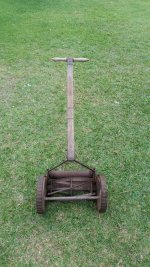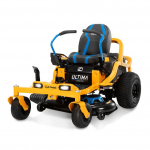Tesla battery packs are EXPENSIVE!
Most tractors would have a fairly expensive battery pack, and the motor controls have to be weather proof.
The premium comes from there, the parts have to be rugged.
And maybe the warranty cost is factored in.
The price for a 5 kW servo motor , and reduction gear, with controls, will be more than a generic small engine, simply because the volumes are more.
Looking at parts counts, a small engine has many more parts, but prices are low.
Most tractors would have a fairly expensive battery pack, and the motor controls have to be weather proof.
The premium comes from there, the parts have to be rugged.
And maybe the warranty cost is factored in.
The price for a 5 kW servo motor , and reduction gear, with controls, will be more than a generic small engine, simply because the volumes are more.
Looking at parts counts, a small engine has many more parts, but prices are low.
Sorry, but you are misinformed. My very capable tractor uses lead-acid batteries. A very logical choice for a tractor. The excellent power to weight ratio of Li-Ion is not needed in a tractor. Indeed, weight is an advantage! So it's relatively cheap batteries here.
Likewise the motor. I don't know what the power rating of the motor is, but I doubt it's even half of your 2500W estimate. There's simply no need. Tractors need torque, not power as they move slowly. Given that the 48V (4 x 12V) 50AH batteries last me well over an hour of cutting I would guess that the motor is closer to 1KW. As far as weatherproof controls are concerned, that's not a big deal. No more expensive than a weatherproof distributor or spark plug wire/boot.
Likewise the motor. I don't know what the power rating of the motor is, but I doubt it's even half of your 2500W estimate. There's simply no need. Tractors need torque, not power as they move slowly. Given that the 48V (4 x 12V) 50AH batteries last me well over an hour of cutting I would guess that the motor is closer to 1KW. As far as weatherproof controls are concerned, that's not a big deal. No more expensive than a weatherproof distributor or spark plug wire/boot.
Wow eh?
Everything old is new again...
I'll bet this would kick that GE's butt though LOL
View attachment 1035934
https://www.cubcadet.ca/en/zero-turn-mowers/zt1-42e/34ABA2CSB10.html#start=1
That Club Cadet is one of the best lawn mower designs for dodging obstacles.
Attachments
50Ah x 48V = 2400W, gone in one hour.
That is 4 small truck batteries, car batteries here are 40-45 Ah at 20 hours.
I did say 5 kW, which is 5000W. Not 2500W. Please read again.
Torque on a DC motor is proportional in reverse to speed, and the power demand goes up.
So higher volts means less current.
But the electronics have to be epoxy potted quality, so they are expensive compared to home stuff.
And lead acid batteries do fail suddenly, particularly when they are discharged at high rates.
That is 4 small truck batteries, car batteries here are 40-45 Ah at 20 hours.
I did say 5 kW, which is 5000W. Not 2500W. Please read again.
Torque on a DC motor is proportional in reverse to speed, and the power demand goes up.
So higher volts means less current.
But the electronics have to be epoxy potted quality, so they are expensive compared to home stuff.
And lead acid batteries do fail suddenly, particularly when they are discharged at high rates.
Naturally the likelihood of accidents and incidents will increase with popularity. I seen a mechanic bay after a 2000 lb battery blue up. The whole thing was suddenly white. That's the type that is meant for hydraulic lifters. Crown and BT machinery.
I know that mower. I hate that mower.The lawn is part of my workout regimen.
Yes, me too. That mower is the reason motorized mowers were invented.I know that mower.
Thank you. It took a while for me to grok when I first looked hard at dirt-movers, but you absolutely WANT weight on your drive wheels when pulling on dirt. "Stupid" details like 500 pound castings (on a backhoe) are actually what you want. Made clear by them selling and recommending more add-on weight for most uses. Car-drivers don't get it.The excellent power to weight ratio of Li-Ion is not needed in a tractor. Indeed, weight is an advantage!
This is also why cars typically drank taxed high-octane and tractors drank the untaxed kerosene. The engine makes less HP per pound and would be a slug on the road but the weight is spot-on for tractoring.
Sometimes they do different. My 1967 FORD backhoe had a remarkably light Diesel and an incredibly heavy gear-set. I think the engine was slated for other jobs AND it was considered better if it could be easily hoisted-out and repaired in the shop, even at the dealer. It could be hauled in a pickup truck.
Mercedes OM616 engine was used in the then current 240D, some Mercedes vans, DAF trucks, and ambulances.
Still made in India in evolved form, with a 2.6 liter displacement, and common rail injection.
Very popular in ambulances , Force Motors built Traveler, possibly itself a Mercedes model.
Ford might have done the same thing, using a high volume production engine.
Repeatedly discharging a battery at high rates will cause issues.
Like explosions, as hydrogen is released, and that meets arc at battery terminals...apart from shedding at the plates, resulting in less charge discharge cycles than intended.
If it is a traction (fork lift class) battery, they are intended for this use, but not car batteries.
Those are mostly rated 100 Ah and up, intended for 8 hours of use.
So your mower supplier might have compromised on battery choice.
Still made in India in evolved form, with a 2.6 liter displacement, and common rail injection.
Very popular in ambulances , Force Motors built Traveler, possibly itself a Mercedes model.
Ford might have done the same thing, using a high volume production engine.
Repeatedly discharging a battery at high rates will cause issues.
Like explosions, as hydrogen is released, and that meets arc at battery terminals...apart from shedding at the plates, resulting in less charge discharge cycles than intended.
If it is a traction (fork lift class) battery, they are intended for this use, but not car batteries.
Those are mostly rated 100 Ah and up, intended for 8 hours of use.
So your mower supplier might have compromised on battery choice.
Bulgaria used to have a giant electric forklift factory called Electrocar - IIRC. They supplied fork lifts for most of the Soviet Block. I've used one, it was pretty good and easier to use than the gas powered lifts. I suppose Electrocar is long gone.
EDIT: It was probably BALKANCAR. But we called the electric ones Electrocar
EDIT: It was probably BALKANCAR. But we called the electric ones Electrocar
Last edited:
In college I worked Hyster and Clark fork-lifts in a die castings factory. They not only had lead-acid batteries, but also a big counter-weight on the rear end. You couldn't pick up a load of castings without it.Thank you. It took a while for me to grok when I first looked hard at dirt-movers, but you absolutely WANT weight on your drive wheels when pulling on dirt. "Stupid" details like 500 pound castings (on a backhoe) are actually what you want. Made clear by them selling and recommending more add-on weight for most uses. Car-drivers don't get it.
Nope, still running but they went to using LPG for fuel for the "electrocar".Bulgaria used to have a giant electric forklift factory called Electrocar - IIRC. They supplied fork lifts for most of the Soviet Block. I've used one, it was pretty good and easier to use than the gas powered lifts. I suppose Electrocar is long gone.
EDIT: It was probably BALKANCAR. But we called the electric ones Electrocar
I met a guy today who sells power tools and told me I`m crazy of wanting a petrol mower for that size of lawn. He proposed Makita battery powered mower but I`d take his advice with a big grain of salt. I know from experience (with power tools) that big power does not go well with batteries. And I need power. And the Honda HRG 466 is damn heavy...
In the spirit of here being a DIY forum maybe we should design our own mower 😀 And it should have speakers and a beer holder coz mowing can be more fun.
Take an off the shelf electric mower, add inverter and battery. DIY Battery Electric mower 🙂
Take an off the shelf electric mower, add a generator... DIY Hybrid mower 🙂
Take an off the shelf electric mower, add a generator... DIY Hybrid mower 🙂
Ah ha, thanks! The factory joke at the time was "The Japanese love Balcancar and are buying them in terrific numbers!" "Yes, they melt them down and make 3 forklifts out of them." (Bulgarian humor)Nope, still running but they went to using LPG for fuel for the "electrocar".
I had never aspired to own a riding mower, but my wife took pity on me pushing the old one for almost an hour every few days. She bought a 750cc Kohler V-Twin mower with the twin bags on back, thing does wheelies and some fun donuts if desired. I had to rejet the carb as it was pretty rich as delivered. Still going strong after nearly 20 years.
The mower that always made the most sense was the Sunbeam electric that was at my Great Grandma’s house in the late 80s. No gas, no oil, no stink, always worked…
Wouldn’t be practical in my current layout however.
The mower that always made the most sense was the Sunbeam electric that was at my Great Grandma’s house in the late 80s. No gas, no oil, no stink, always worked…
Wouldn’t be practical in my current layout however.
Tried that, the trimmings never wind up decomposing before they effectively start to kill off the lawn. Trust me, I couldn’t care less about a lawn really, but this was bad, had to bag it and dump it in a dedicated compost pile.I keep reading about bags. My last mower was a mulching mower. Worked like a charm for me. It did have a bag, but didn't need it because of the mulching blade.
- Home
- Member Areas
- The Lounge
- Lawn mowers

